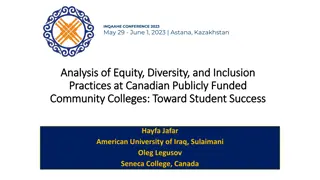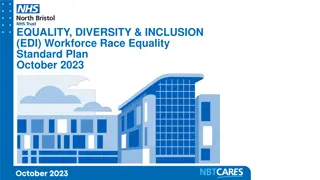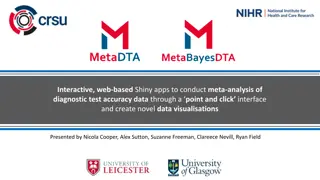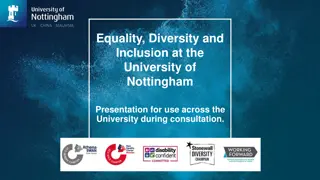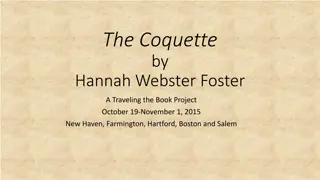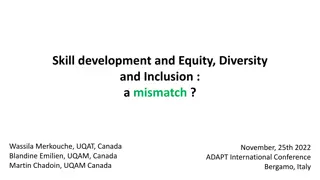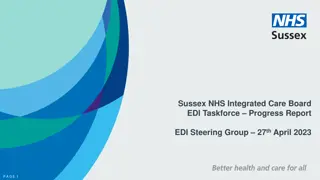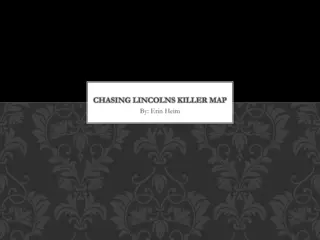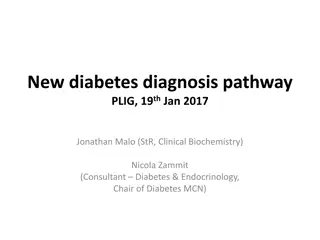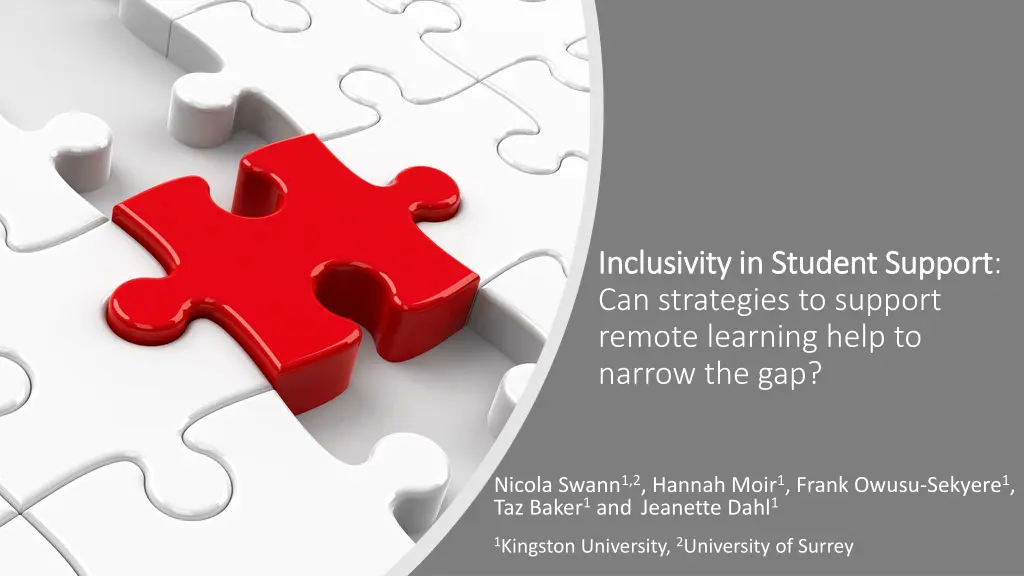
Strategies for Narrowing the Student Attainment Gap in Higher Education
Explore the impact of remote learning strategies on narrowing the educational attainment gap in higher education, focusing on inclusivity and support for students of diverse backgrounds. Addressing the challenges faced by BAME students, this study delves into the effectiveness of inclusive frameworks, highlighted by student surveys and focus groups at Kingston University.
Download Presentation

Please find below an Image/Link to download the presentation.
The content on the website is provided AS IS for your information and personal use only. It may not be sold, licensed, or shared on other websites without obtaining consent from the author. If you encounter any issues during the download, it is possible that the publisher has removed the file from their server.
You are allowed to download the files provided on this website for personal or commercial use, subject to the condition that they are used lawfully. All files are the property of their respective owners.
The content on the website is provided AS IS for your information and personal use only. It may not be sold, licensed, or shared on other websites without obtaining consent from the author.
E N D
Presentation Transcript
Inclusivity in Student Support Inclusivity in Student Support: Can strategies to support remote learning help to narrow the gap? Nicola Swann1,2, Hannah Moir1, Frank Owusu-Sekyere1, Taz Baker1and Jeanette Dahl1 1Kingston University, 2University of Surrey
In Higher Education institutions, differences in attainment are widely observed between UK domiciled white students and those of UK domiciled Black, Asian and minority ethnic (BAME) groups. In 2018/19, an awarding gap of 13.4% was evident in achievement of 1st/2.1 degrees between white (81.4%) and BAME (68%) students, which extended to 22% for black students (AdvanceHE, 2020). Background The Awarding Gap At Kingston University, awarding gaps are evaluated through a value added score, which highlights differences that cannot be explained by entry qualifications or the subject of study. An inclusive curriculum framework is embedded in teaching and learning strategy but an awarding gap persists in many courses.
Inclusive Framework Strategy Improve institutional culture Enhance knowledge and skills of staff Provide better support for students Are we providing what students need, with both equality of opportunity and inclusivity? For example, is there sufficient support available to help students engage with academic language (Open University Annual Report, 2013) and improve their own use of language in assessments? Ongoing Challenges Is support accessible and relevant? BAME students may be less likely to access support (Stuart et al., 2011) and do not feel sufficiently supported to reach the standards they wish to achieve (Bunce et al., 2019). Preliminary research highlighted differences in student preferences and found that factors such as location and availability can restrict access to support (Swann et al., 2020).
An online questionnaire was distributed by email to students of the Faculty of Science, Engineering and Computing at Kingston University and promoted by student partners in online sessions. Questions aimed to capture demographic data (course, year group, gender, ethnicity and commuter status) and awareness, experience and preferences of academic support when preparing for assessment. Study Design A focus group, led by student partners, aimed to capture a more comprehensive view of student members preferences (McKenna, 2017). Descriptive statistics and percentages were analysed from the survey, with group comparisons for categorical data carried out using a chi- square test and numerical variables compared using a t-test.
A total of 170 students (114 female, 52 male) completed the survey. 43% reported their ethnicity as white and 57% reported their ethnicity as Black, Asian, mixed or minority ethnicities (BAME). 83% of respondents were age 25 years or under, with 38% studying at Level 4, 16% Level 5 and 27% Level 6. Study Population 77% of the BAME students and 61% of the white students reported that they commuted to University. Average journey times were significantly greater for BAME students (87mins vs 57mins).
Trends in the data suggest small differences between student groups Peer support - 39% white students: 26% BAME students Support hours - 31% white students: 22% BAME students Results Use of Support
The most common response for both groups related to a lack of confidence approaching staff for help (32% BAME, 31% White) Results Reasons for not accessing support * Significant difference between groups, p<0.05
Students showed preferences towards more flexible sources of support Results Student Preferences * * Significant difference between groups, p<0.05
Students showed preferences towards more flexible sources of support Results Student Preferences * * Significant difference between 2019 and 2019, p<0.05
Although awareness of academic support was generally good, less than half of students reported using each of the various sources. Academic staff provided the majority of support, consistent with previous research (Walsh et al., 2009), with Personal Tutors a primary source of support for both student groups. Almost one third of students reported that they did not feel confident contacting staff for help, emphasising the importance of positive staff-student interactions. Discussion Preferences for support leaned towards more flexible options for all students, such as pre-recorded guidelines, virtual meetings and email. Students preferred subject-specific support to centralised Faculty support, although this was valued by a significantly greater number of BAME students than white students.
Strategies employed to support remote learning could improve the accessibility of academic support. Future blended delivery should evaluate and address the impact for all students. Positive relationships with staff are vital for inclusive and accessible academic support. Institutions should work to equip staff with skills and knowledge regarding available support. Conclusions Students value a variety of academic support strategies to suit their learning style and personal needs. Collaboration with students can help to ensure that support is appropriate and relevant.
AdvanceHE (2018) Equality in Higher Education: statistical report 2018 [online]. Available at: https://s3.eu- west-2.amazonaws.com/assets.creode.advancehe-document-manager/documents/ecu/2018-06-ECU_HE- stats-report_students_v5-compressed%20%281%29_1579781967.pdf Bunce, L, King, N, Saran, S and Talib, N (2019) Experiences of black and minority ethnic (BME) students in higher education: applying self-determination theory to understand the BME attainment gap , Studies in Higher Education, pp. 1 14. McKenna, C. (2017). Hearing student views through focus groups: creating spaces for dialogue. The Education Blog. LSE, online at http://blogs.lse.ac.uk/education/2017/05/09/hearing-student-views- through-focus-groups-creating-spaces-for-dialogue/ Sparkes, A. & Smith, B. (2014). Qualitative research methods in sport, exercise and health: From process to product. London: Routledge. References Stuart, M., Lido, C., and Morgan, J., (2011). Personal stories: how students social and cultural life histories interact with the field of higher education. International Journal of Lifelong Education. 30(4) pp. 489 508 Swann, N., Moir, H., Owusu-Sekyere, F., Boddie, T. and Barber, D. Pre-assessment support Is it one size fits all? AdvanceHE Assessment and Feedback Symposium 2020 The Open University (2013). Equality and Diversity Annual Report 2013 [online]. Available at: http://www.open.ac.uk/equality-diversity/sites/www.open.ac.uk.equality-diversity/files/files/ecms/web- content/Annual-Report-2013-Final.pdf Walsh, C., Larsen, C., and Parry, D. (2009) Academic tutors at the frontline of student support in a cohort of students succeeding in higher education, Educational Studies, 35:4, 405-424
Thank you for listening! Any Acknowledgements: Kingston University SADRAS Funding Questions? Contact: Email: n.swann@surrey.ac.uk Twitter: @SwannNicky

